If you're evaluating Ably's chat product for your app, you're likely looking for a reliable way to deliver real-time conversations with low latency and high uptime. Ably's infrastructure-first approach offers developers the tools to build custom chat experiences from the ground up, backed by a globally distributed network.
But Ably isn't the only option. Depending on your project's requirements, you might prefer a platform that offers more out-of-the-box UI components, integrated moderation, or bundled voice and video features. Others might prioritize flexible pricing, compliance certifications, or a self-hosted deployment model.
This guide explores nine top alternatives to Ably Chat, breaking down what each platform does best, where it might fall short, and which use cases it's best suited for.
To start, let's break down Ably's chat product and positioning.
Ably Overview
Ably is a real-time messaging platform designed to deliver low-latency, reliable communication at scale.
Its Chat product builds on Ably's infrastructure to provide one-to-one messaging, group chat, presence indicators, and other common chat capabilities. Developers can integrate via SDKs for major platforms, and the service is backed by a globally distributed network that supports large concurrent user counts and persistent connections.
Advantages of Ably Chat
-
Message Ordering and Delivery Guarantees: Ably's infrastructure ensures messages are delivered once, in the correct order, and without duplication. This is important for maintaining clarity in fast-moving conversations.
-
Resilient Connectivity: Automatic reconnection and message replay help maintain a smooth chat experience even in unstable network conditions.
-
Built-In Core Chat Features: Features like presence, typing indicators, reactions, and message history are available out of the box, reducing the need for custom development.
-
Global Performance: With data centers distributed worldwide, Ably aims for consistently low latency, which benefits geographically dispersed user bases.
-
Extensibility Beyond Chat: Since Ably is an infrastructure platform, teams can combine chat with other real-time features like live updates, notifications, or data synchronization under the same architecture.
Drawbacks of Ably Chat
-
No Native Voice or Video: Ably focuses on text-based chat and broader real-time messaging, so teams needing integrated voice or video will have to add third-party providers.
-
Limited UI Kit Compared to Some Competitors: Ably now offers a React Chat UI Kit with pre-built components (e.g., message list, input, avatars, chat window) that can speed up front-end development, but it’s currently limited to React and may not be as comprehensive or as customizable out of the box as UI kits provided by other dedicated chat platforms.
-
Moderation Still Requires Third-Party Services: Ably doesn’t include its own native AI moderation engine, but it does offer built-in integrations with popular third-party moderation providers like Hive, Tisane, Bodyguard, and Microsoft Azure Content Safety. These make it straightforward to add automated content filtering and abuse detection with minimal setup, though you’re still relying on external moderation providers rather than a fully native solution.
-
Less Industry-Specific Tooling: Ably's chat product is designed as a general-purpose solution. Platforms tailored to specific verticals, such as gaming, telehealth, or marketplaces, may offer more ready-to-use, domain-focused features.
-
Pricing Predictability at Scale: Ably's usage-based pricing can be cost-effective for smaller workloads, but teams with rapidly growing MAU or message volume may find forecasting monthly costs more complex than with flat-rate plans.
Main Ably Features
Ably Chat's functionality is built on top of the company's real-time messaging infrastructure. Key features include:
-
One-to-One and Group Messaging: Support for private chats, public channels, and large group conversations.
-
Presence Indicators: Real-time tracking of users joining, leaving, or currently active in a channel.
-
Typing Indicators: Notifications that another participant is composing a message.
-
Message History and Persistence: Storage and retrieval of past messages for conversation continuity.
-
Reactions and Editing: Emoji reactions to messages, plus the ability to edit or delete messages.
-
Push Notifications: Native integration with push services for message alerts on mobile and desktop.
-
Scalable Pub/Sub Architecture: Backed by Ably's globally distributed network for low-latency message delivery.
Ably Pricing
Ably employs a consumption-based, per-minute billing model, making it highly flexible and transparent for teams building chat applications with variable usage patterns.
Pricing Structure:
Base package fee:
-
Free: Ideal for proofs of concept or experimentation. Includes 200 concurrent connections, 500 messages/second, and 6 million messages/month.
-
Standard: $29/month plus usage-based charges. Includes higher capacity: 10,000 connections, 10,000 channels, unlimited messages, and up to 2,500 messages/second.
-
Pro: $399/month plus usage. Designed for growing businesses requiring 50,000 connections/channels and 10,000 messages/second.
-
Enterprise: Custom pricing and capacity. Offers unlimited usage, 99.999% uptime SLAs, advanced support, compliance enhancements (e.g., HIPAA), dedicated clusters, and regional data routing.
Usage is billed on top of the base fee at the following rates:
-
Messages: $2.50 per million
-
Connection Minutes: $1.00 per million minutes
-
Channel Minutes: $1.00 per million minutes
What to Consider When Evaluating
When comparing Ably Chat to other platforms, it's worth looking beyond core messaging features and thinking about how the service will fit into your broader product architecture and roadmap.
A few factors to keep in mind:
-
End-to-End Communication vs. Infrastructure: Ably Chat is part of a general-purpose real-time infrastructure platform. If you need an all-in-one chat, voice, and video stack, some competitors may offer more built-in features. If you want to combine chat with other event-driven capabilities, Ably's architecture is a strong match.
-
UI Development Effort: Ably provides SDKs for core chat functionality but leaves the front-end UI entirely in your hands. Competitors with pre-built UI kits can shorten time to market if speed is a priority.
-
Moderation Requirements: Ably doesn't ship with native AI moderation. If your use case demands content filtering, spam detection, or abuse prevention, you'll need to plan for a third-party integration or custom build.
-
Scalability and Performance: Ably's globally distributed edge network supports low-latency delivery and high concurrency, but performance benchmarks and SLAs can vary by provider. For mission-critical scenarios, compare documented latency, uptime guarantees, and failover capabilities.
-
Compliance and Security: If you're building for regulated industries, ensure the platform supports the necessary standards (e.g., HIPAA, GDPR) and provides security features such as encryption, role-based access controls, and regional data routing.
Ably Chat Versus Top 9 Competitors
Ably Chat vs. Stream
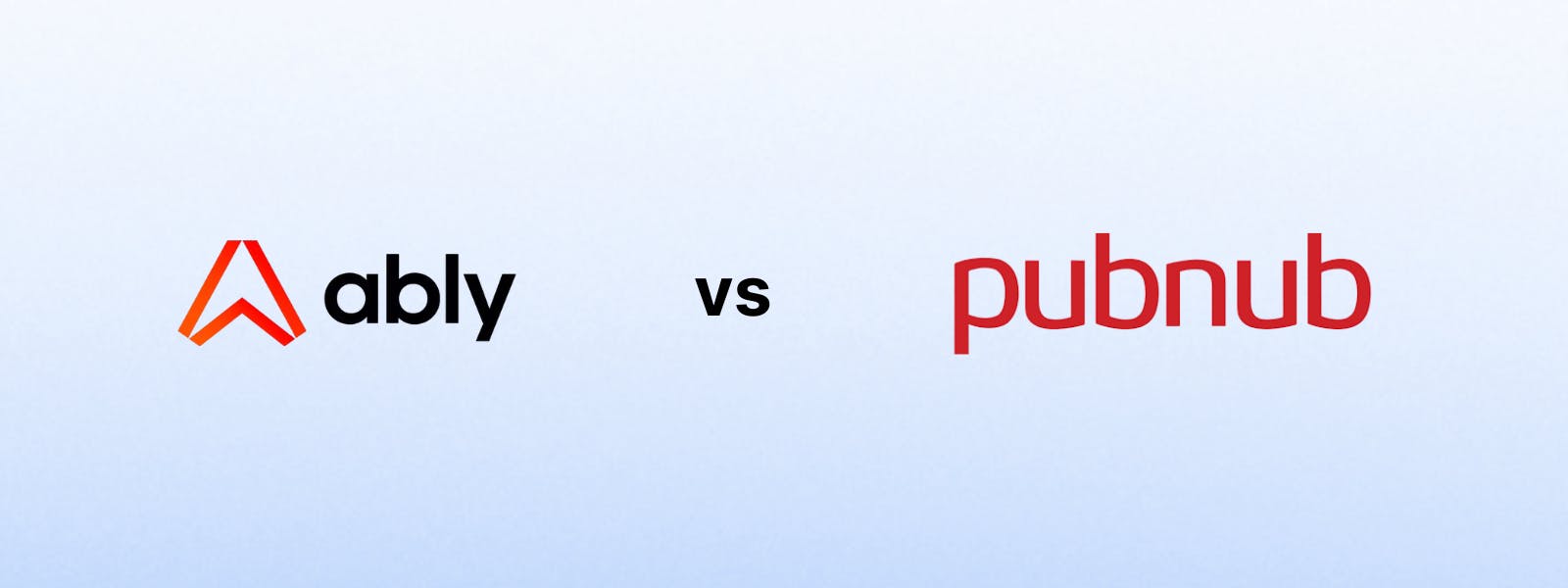
Stream provides enterprise-grade APIs for chat, video, activity feeds, and AI moderation, powering rich in-app messaging experiences without the need to build real-time infrastructure from scratch.
Ably Chat, by contrast, is built on top of Ably's general-purpose real-time infrastructure, giving teams the flexibility to create custom messaging layers. Stream's Chat API is designed specifically for in-app messaging from the ground up, with features and tooling aimed at reducing time to market.
Stream Main Features
-
One-to-One, Group, and Channel Messaging: Support for private conversations, public channels, and large-scale community chats.
-
Pre-Built, Customizable UI Kits: Ready-to-use components for React, React Native, iOS, Android, Flutter, and more to accelerate front-end development.
-
Advanced Moderation: Native tools for text, image, and video moderation, including block/ban controls, profanity filtering, spam detection, and AI-assisted review.
-
Engagement Features: Reactions, threads, mentions, rich media sharing, polls, and typing indicators for interactive chat experiences.
-
Voice and Video Integration: Optional real-time audio and video powered by Stream's own APIs for a unified communications stack.
-
Scalability and Performance: Low-latency delivery supported by a global edge network, with architecture designed to handle large concurrency and high message volumes.
-
Compliance and Security: HIPAA and GDPR compliance, encrypted transport, and role-based access controls for sensitive use cases.
Stream Pricing
Stream's chat plans are priced by monthly active users, with higher tiers providing access to more advanced features and capabilities.
Chat Pricing:
-
Start: Starts at $399/month for up to 10,000 MAU
-
Elevate: Starts at $599/month for up to 10,000 MAU
-
Enterprise: Talk to Sales
Key Differences: Stream vs. Ably
-
Feature Breadth: Stream includes built-in voice, video, and moderation alongside chat; Ably focuses solely on messaging features.
-
UI Components: Stream offers fully customizable UI kits for popular frameworks; Ably requires teams to design their own interfaces.
-
Moderation Tools: Stream has native moderation for text, images, and video; Ably relies on external integrations.
-
Scalability Approach: Ably's infrastructure supports a wide range of real-time workloads beyond chat; Stream's architecture is tuned specifically for large-scale chat and engagement scenarios.
When to Consider Each
-
Ably: Best for teams that want to build chat as part of a larger, multi-use real-time system, and have the resources to handle UI and moderation themselves.
-
Stream: Best for teams that want an end-to-end chat solution with integrated engagement features and minimal setup overhead.
Ably Chat vs. CometChat
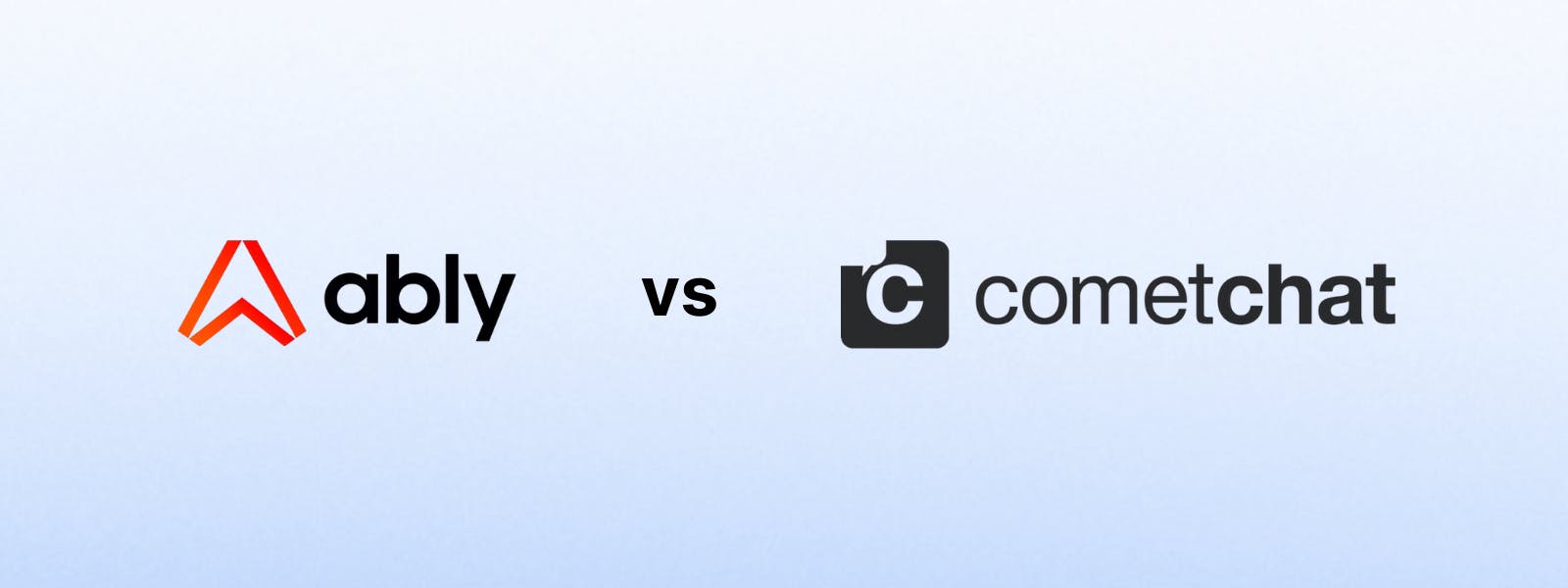
CometChat is a communication platform built specifically for in-app messaging, voice, and video. It offers SDKs, pre-built UI kits, and moderation tools for industries such as education, healthcare, dating, and online marketplaces. Ably Chat, in contrast, is part of a broader real-time infrastructure platform designed to power multiple event-driven use cases, including messaging.
Ably Versus CometChat
Ably Chat provides one-to-one and group messaging, presence, typing indicators, reactions, and message history, all delivered over Ably's global network. Its infrastructure-first approach gives developers the flexibility to build highly customized chat experiences and extend them alongside other real-time features like live updates, notifications, or location tracking.
CometChat, by comparison, focuses entirely on in-app communication and comes with more out-of-the-box capabilities, including voice and video calling, AI moderation, and a no-code widget for rapid deployment. It also offers vertical-specific extensions that speed up implementation for certain industries.
Both platforms support essential chat functionality—message history, file sharing, push notifications, and moderation—and comply with standards such as HIPAA and GDPR. The key difference lies in their approach: Ably prioritizes infrastructure flexibility, while CometChat aims to minimize build time with ready-to-use communication features.
Where Ably stands out is its ability to handle multiple real-time workloads beyond chat under a single architecture. CometChat, on the other hand, may be a better fit for teams that want an all-in-one communications package with pre-built UI and calling capabilities.
CometChat Pricing
CometChat's chat pricing scales with the number of features and add-ons:
-
Free: $0/month for up to 100 MAU
-
Basic: Starting at $279/month for up to 10,000 MAU
-
Advanced: Starting at $379/month for up to 10,000 MAU
-
Enterprise: Contact Sales
Custom pricing applies for apps with more than 50,000 MAU, as well as for voice, video, and HIPAA-compliant deployments.
Ably Chat vs. Twilio Conversations
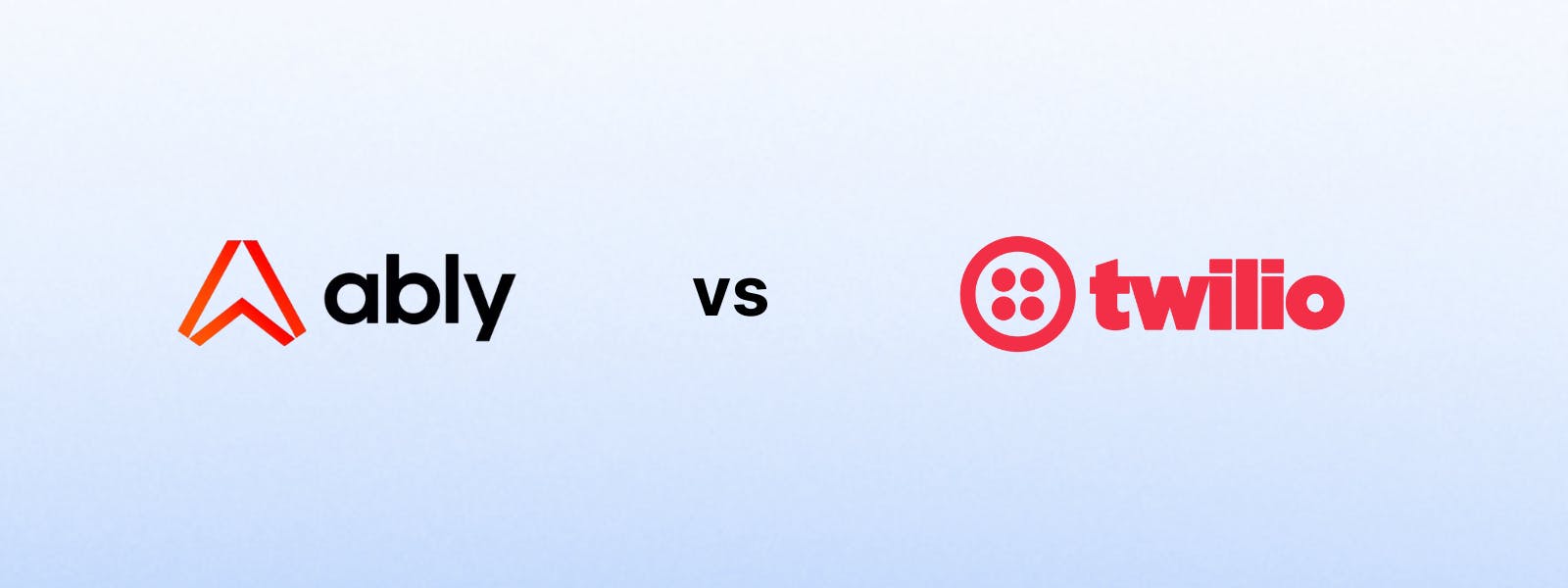
Twilio is a cloud communications platform best known for its APIs across SMS, voice, email, and chat. Its Conversations API supports multi-channel messaging, enabling developers to unify chat across in-app, SMS, and third-party platforms like WhatsApp. Ably Chat, in contrast, is designed as an in-app chat SDK built on Ably's real-time infrastructure, with a focus on low-latency, reliable messaging.
Twilio Versus Ably
Twilio Conversations makes it possible to deliver customer support and engagement across multiple messaging channels, which is particularly valuable in industries like retail, logistics, and healthcare. Ably Chat, by comparison, is focused on in-app chat experiences where developers need fine-grained control and the ability to extend chat alongside other real-time features like live updates or notifications.
Both platforms provide essential chat features such as message history, file sharing, push notifications, and moderation. Each also supports compliance requirements like HIPAA and SOC 2, making them viable for enterprise and regulated industries.
However, Twilio supports a smaller number of SDKs compared to Ably, and its focus on multi-channel delivery means developers may spend more time assembling in-app chat functionality from its APIs. Ably, on the other hand, does not include built-in voice or video, while Twilio provides broader communication APIs out of the box.
Twilio's strength lies in its reliability guarantees and straightforward, usage-based pricing model. Ably differentiates with its global real-time network and guarantees around message ordering and delivery, but teams will need to build more of the surrounding experience themselves.
Twilio Pricing
Twilio Conversations pricing is usage-based.
Conversations API Pricing:
-
Usage: $0.05/ active user per month
-
Media Storage: $0.25/ GB per month
Ably Chat vs. Agora Chat
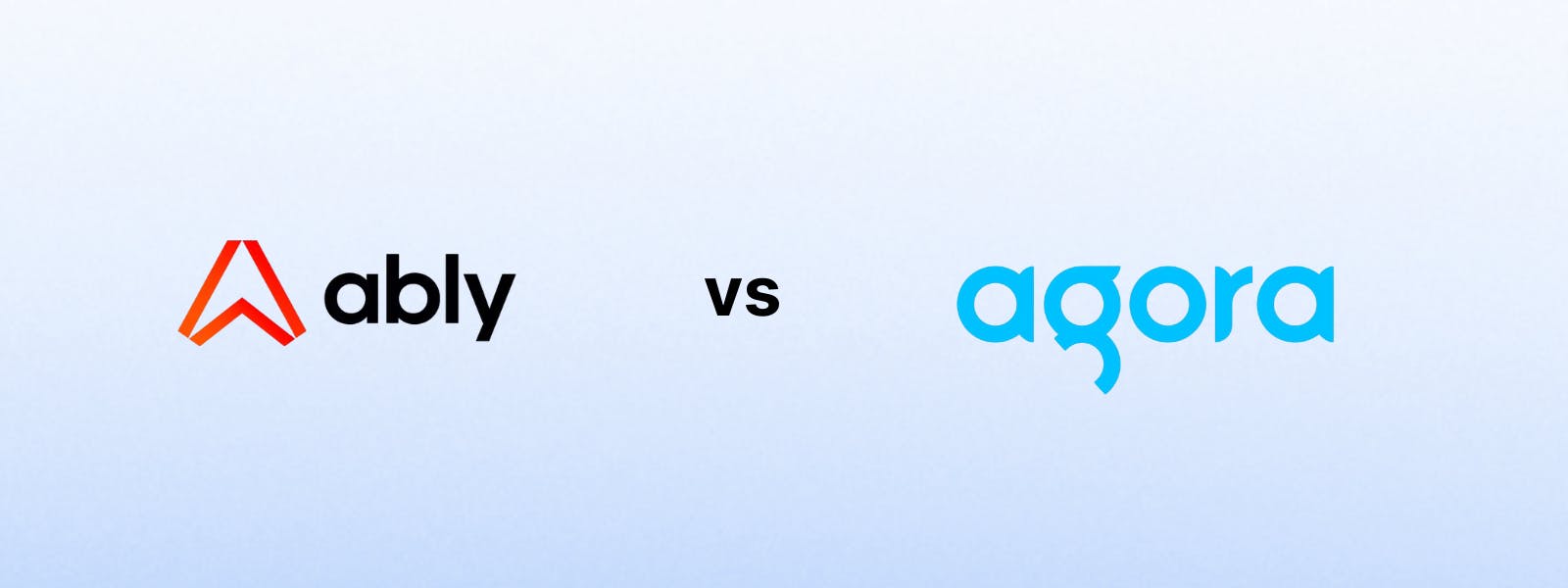
Agora is a real-time engagement platform best known for its voice and video APIs. More recently, it has expanded into messaging with the Agora Chat SDK, which supports in-app conversations across web and mobile platforms. Ably Chat, on the other hand, is focused solely on messaging built on top of Ably's real-time infrastructure, with reliability and scalability at its core.
Agora Versus Ably
Agora Chat provides developers with SDKs to add one-to-one messaging, group chat, media sharing, user presence, and notifications. Its close integration with Agora's voice and video APIs makes it a strong choice for apps where text chat is just one part of a richer, media-heavy experience, such as livestreaming or virtual classrooms.
Ably Chat offers similar core features—private and group messaging, presence, typing indicators, reactions, and history—but does not bundle voice or video. Instead, it emphasizes infrastructure reliability, guaranteeing message ordering, delivery, and continuity even in unstable network conditions.
Both platforms meet compliance standards like GDPR and HIPAA, and both can scale to large concurrent audiences. The key difference lies in focus: Agora positions itself as a complete engagement platform, while Ably positions itself as a flexible infrastructure service that teams can extend beyond chat to handle other real-time workloads.
Where Agora falls short is moderation; it does not include native AI moderation tools, instead relying on third-party services like Microsoft Azure Moderator. Ably similarly lacks built-in moderation, requiring external integrations or custom development.
Agora Pricing
Agora offers free usage up to a threshold and scales pricing based on MAU.
Chat Pricing:
-
Starter: Starts at $349/month for up to 5,000 MAU
-
Pro: Starts at $699/month for up to 10,000 MAU
-
Enterprise: Talk to Sales
Ably Chat vs. PubNub Chat

PubNub is a real-time communication platform originally built for publish/subscribe messaging and data synchronization. Over time, it has expanded into chat with SDKs that allow developers to add real-time conversations to apps. Ably Chat shares similar infrastructure roots, but it offers a dedicated SDK focused on chat experiences built on top of Ably's global edge network.
PubNub Versus Ably
PubNub Chat provides core features such as one-to-one and group messaging, presence detection, message storage, and access control. It is a flexible option for developers who want to tightly customize the chat layer, particularly in use cases where chat is part of a larger real-time system like IoT dashboards or multiplayer games.
Ably Chat offers comparable core functionality—private and group conversations, typing indicators, reactions, presence, and message history—but is delivered with strict guarantees around message ordering, delivery, and reconnection. Its strength lies in infrastructure reliability, providing consistency even under heavy load or unstable networks.
Neither platform provides pre-built UI kits, meaning teams are responsible for building the front-end experience. Both also require external integrations or custom logic for advanced moderation, though PubNub has a longer history as an infrastructure provider and offers more APIs for non-chat workloads like data streaming.
Ably differentiates itself in its strong SLA commitments and global edge architecture, which are designed to minimize latency. PubNub, meanwhile, is often chosen by developers who want broad real-time functionality with chat as just one of many possible features.
PubNub Pricing
PubNub offers tiered pricing plans based on monthly active users and feature access.
-
Starter: From $98/month
-
Pro: Contact Sales
Ably Chat vs. TalkJS
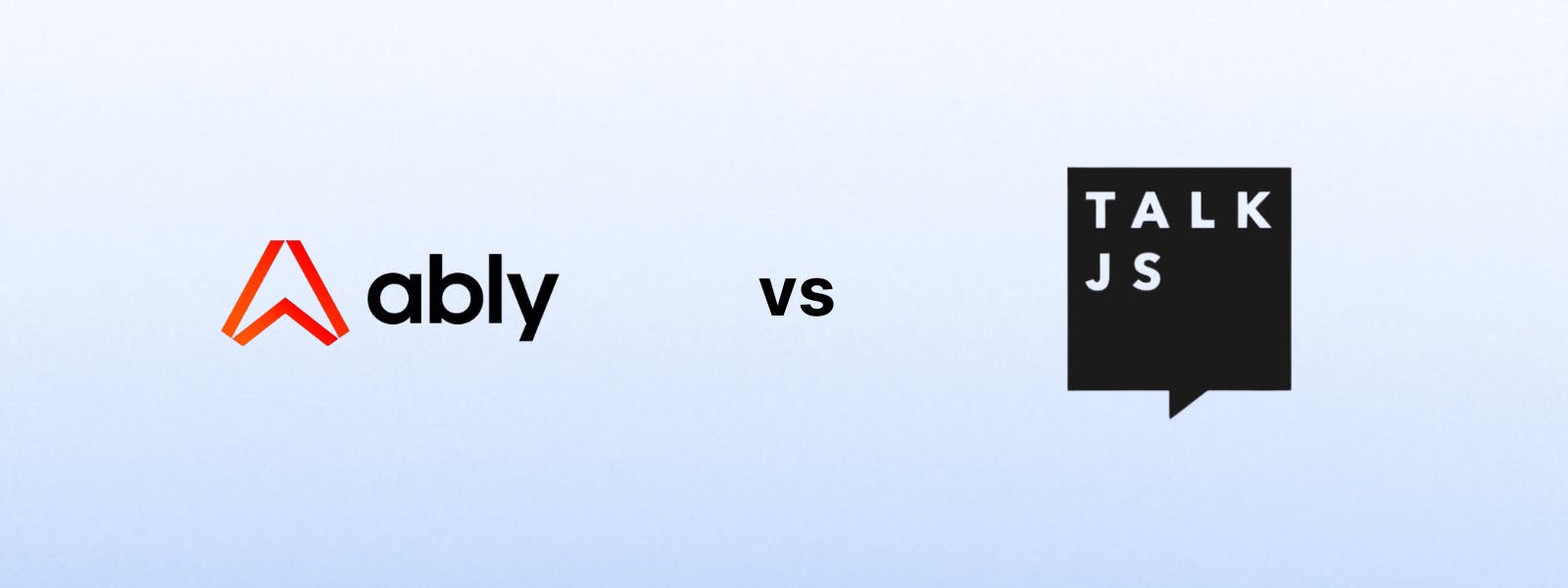
TalkJS is a chat service designed to help developers add messaging features quickly using prebuilt UI components. It's often used in marketplaces, hiring platforms, and online communities where chat is a supporting feature rather than the core product. Ably Chat, in contrast, is built on real-time infrastructure and is designed for teams that want to create more customizable messaging experiences alongside other event-driven features.
TalkJS Versus Ably
TalkJS emphasizes speed of implementation. With just a few lines of code, developers can embed a styled chat UI that includes essentials like one-to-one messaging, group chat, read receipts, file sharing, and moderation. This makes it a strong fit for teams that want a turnkey messaging layer with minimal development effort.
Ably Chat provides similar core chat features, but does not include prebuilt UI components. Instead, it gives developers more control over customization while also providing the reliability benefits of Ably's global edge network, including message ordering, delivery guarantees, and automatic reconnection.
Both platforms support moderation tools, but TalkJS handles these at a more basic level (e.g., admin controls), while Ably relies on external integrations or custom development for advanced moderation. TalkJS is simpler and opinionated, while Ably is flexible and infrastructure-focused.
Where TalkJS stands out is ease of use: it's designed to be up and running quickly. Ably is better suited for teams that want a real-time backbone capable of supporting chat alongside additional workloads like live notifications or collaboration tools.
TalkJS Pricing
TalkJS offers three pricing plans based on MAU and feature access:
-
Basic: $279/month for 10,000 MAU
-
Growth: $569/month for 25,000 MAU
-
Enterprise: Custom pricing
Ably Chat vs. Pusher
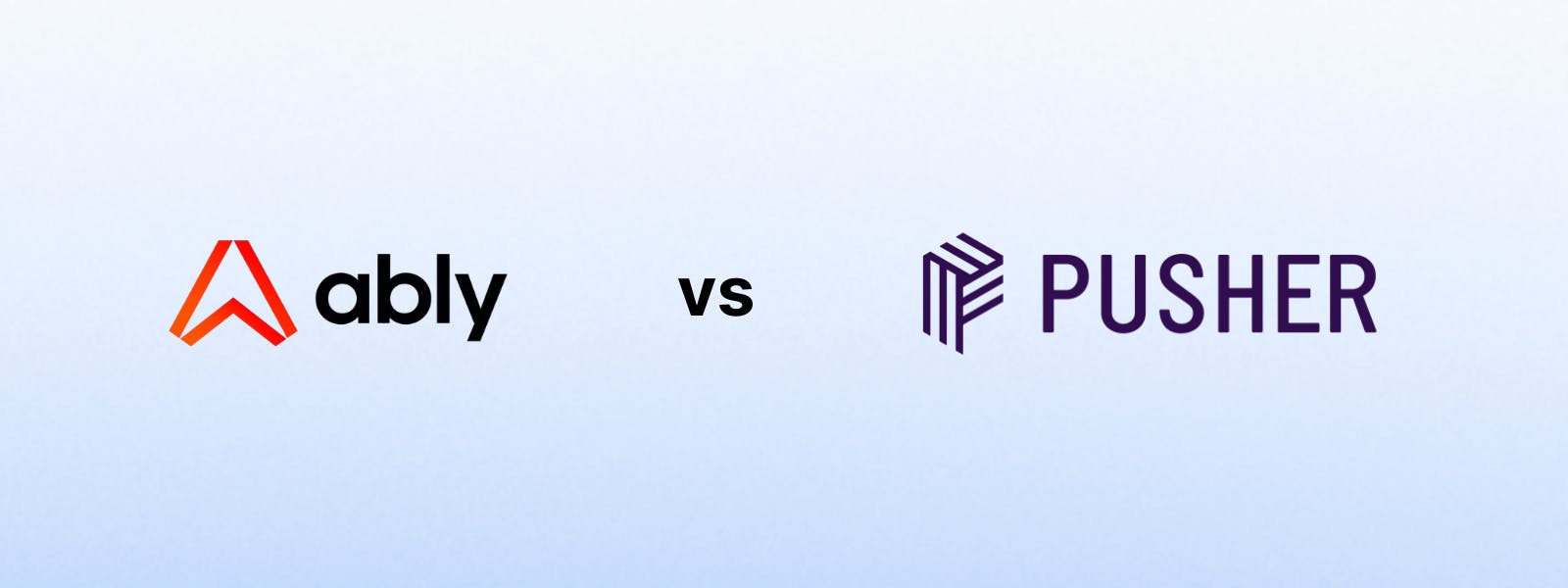
Pusher is a real-time messaging service that provides APIs for pub/sub communication, presence, and push notifications. Its Channels product has been widely adopted by developers who need a simple way to add event-driven functionality to apps. Ably Chat, while also infrastructure-based, offers a dedicated chat SDK on top of its real-time network, providing a more structured path for building in-app conversations.
Pusher Versus Ably
Pusher Channels supports event broadcasting, presence, and message history, and it can be extended to build basic chat features. Developers often use it for notifications, collaborative tools, and lightweight chat scenarios. However, it lacks a dedicated chat product with pre-defined capabilities like reactions, typing indicators, or chat-specific APIs.
Ably Chat provides these chat-specific features out of the box, along with ordering and delivery guarantees that help maintain message integrity in high-throughput environments. Both platforms handle reconnection and reliability, but Ably is designed for large-scale concurrency across a global edge network, whereas Pusher relies more on a regional infrastructure model.
Neither service includes pre-built UI kits, meaning teams are responsible for building the chat interface. Moderation must also be implemented separately, though Ably's extensibility makes it easier to connect to external moderation services.
Pusher appeals to developers who want a simple, event-driven model for lightweight real-time features. Ably, on the other hand, is better suited for teams that need strict delivery guarantees, consistent performance at scale, and a chat-focused SDK built on top of pub/sub infrastructure.
Pusher Pricing
Pusher offers various scaling pricing plans based on concurrent connections (CC):
-
Startup: $49/ month for 500 CC
-
Pro: $99/ month for 2,000 CC
-
Business: $299/ month for 5,000 CC
-
Premium: $499/ month for 10,000 CC
-
Growth: $699/ month for 15,000 CC
-
Plus: $899/ month for 20,000 CC
-
Growth Plus: $1,299/ month for 30,000 CC
Ably Chat vs. MirrorFly
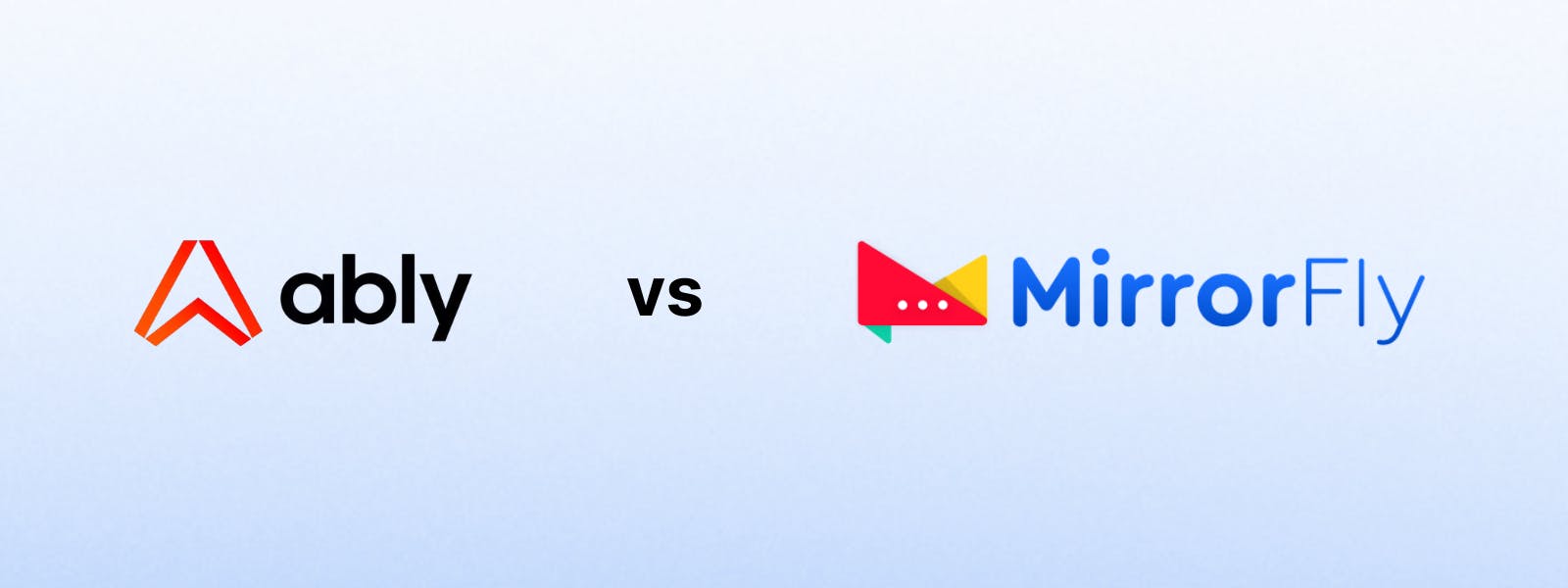
MirrorFly is a chat and communication SDK provider offering both cloud-hosted and self-hosted deployment options. It provides APIs for chat, voice, and video, making it attractive to teams that want flexibility in how and where they run their messaging stack. Ably Chat, by comparison, is a fully managed cloud service focused on real-time messaging infrastructure, offering SDKs for in-app chat built on its global network.
MirrorFly Versus Ably
MirrorFly's chat solution includes features such as one-to-one messaging, group chat, media sharing, typing indicators, read receipts, and presence. It also offers integrated voice and video calling, along with moderation tools and compliance options like HIPAA support. The self-hosted model gives enterprises full control over data, customization, and deployment.
Ably Chat provides core messaging features such as private and group conversations, presence, reactions, typing indicators, and message history. Unlike MirrorFly, it does not include native voice or video, but it emphasizes reliability through message ordering, delivery guarantees, and global low-latency performance.
Both platforms are designed to scale, but their approaches differ: Ably focuses on multi-tenant infrastructure backed by SLAs and five years of continuous uptime, while MirrorFly appeals to teams that need on-premises deployment or want to avoid vendor lock-in.
MirrorFly's appeal comes from its deployment flexibility. It offers both cloud and self-hosted options along with built-in support for chat, voice, and video. Ably, by contrast, emphasizes infrastructure reliability and the ability to extend beyond chat into other real-time use cases.
MirrorFly Pricing
MirrorFly offers pricing plans based on monthly active users (MAU), with separate tiers for chat-only and full communication features.
- Essentials Plan (Chat only): $399/month for 5,000 MAU
Ably Chat vs. Social.plus
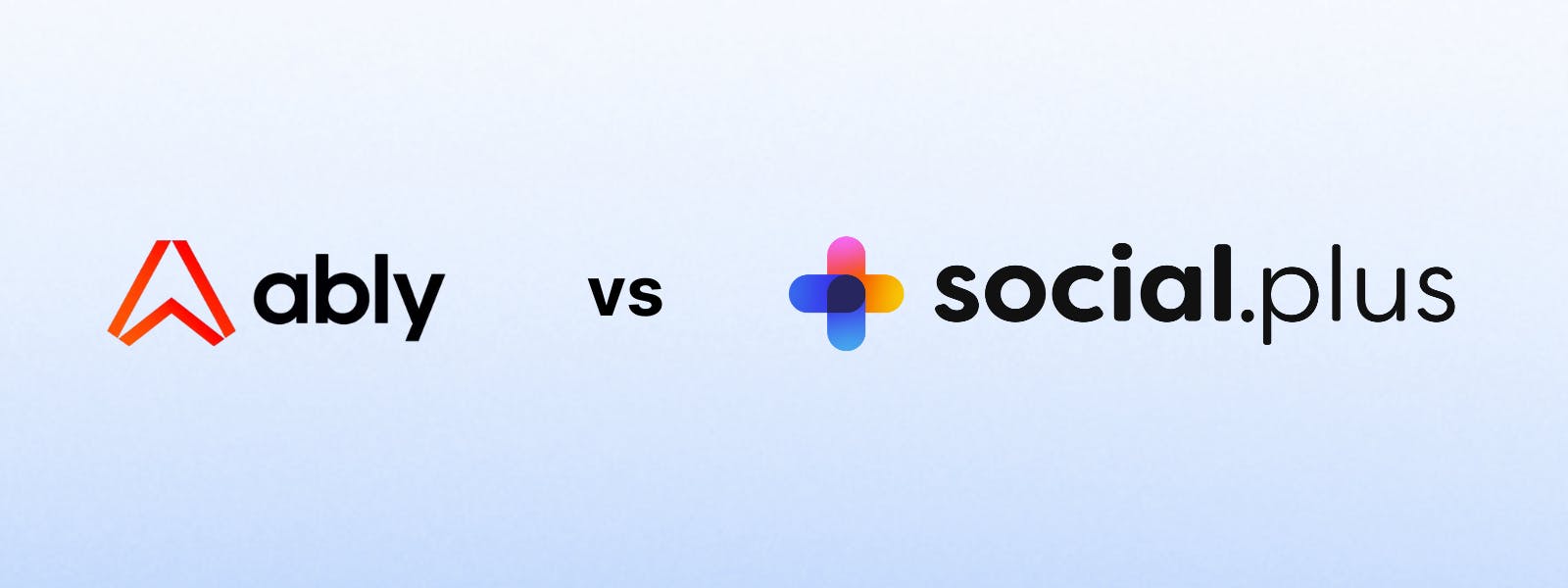
Social.plus is a communication platform that provides APIs for chat, voice, and video, with a focus on social networking and community-driven apps. It bundles messaging features with engagement tools like reactions, notifications, and user profiles. Ably Chat, in contrast, is an infrastructure-first product centered on reliable, low-latency in-app messaging.
Social.plus Versus Ably
Social.plus offers one-to-one messaging, group chat, media sharing, push notifications, and presence, along with integrated calling options. It is particularly targeted toward social and community platforms, with built-in features for user engagement and community management.
Ably Chat provides similar chat fundamentals—messaging, reactions, typing indicators, history, and presence—but without vertical-specific extensions. Instead, it emphasizes guarantees around message ordering, delivery, and reconnection, making it attractive for apps where reliability under scale is critical.
Both platforms support compliance requirements and can scale to large audiences, but their positioning is different. Social.plus focuses on providing a complete social communication layer with engagement built in, while Ably offers a foundation that developers can extend into many real-time scenarios beyond chat, such as live dashboards, notifications, or collaboration tools.
Where Social.plus stands out is its out-of-the-box social engagement tooling, which reduces the amount of custom development needed for community apps. Ably's strength lies in infrastructure reliability and flexibility for teams that want to design their own chat experience within a broader real-time system.
Social.plus Pricing
Social.plus uses MAU-based pricing with yearly license agreements and volume discounts. Plans are structured around feature access:
-
Core: Includes access to all features, text and image moderation, chat and social analytics, and standard support.
-
Max: Adds AI analytics and research, AI moderation, and full HD live streaming on top of Core.
-
Enterprise: Tailored for enterprise-grade security and service, with priority support and SSO/SAML.
Exact pricing is not listed publicly and requires contacting sales.
Alternatives Comparison Chart
| Provider | Chat SDKs | Voice & Video | Built-in Moderation | UI Kits | Global Edge Network | HIPAA Compliance | Deployment Flexibility |
|---|---|---|---|---|---|---|---|
| Ably | ✅ (Infra-focused) | ❌ | ❌ (External integration needed) | ❌ | ✅ (Global edge network) | ✅ | ❌ (Cloud only) |
| Stream | ✅ | ✅ | ✅ (Text, image & video) | ✅ | ✅ | ✅ | ❌ (Cloud only) |
| CometChat | ✅ | ✅ | ✅ (AI + extensions) | ✅ | ✅ (Multi-region) | ✅ | ❌ (Cloud only) |
| Twilio | ✅ (Conversations API) | ✅ | Partial (via admin/custom AI) | ✅ | ✅ | ✅ | ❌ (Cloud only) |
| Agora | ✅ | ✅ (Core strength) | ❌ (Relies on 3rd party) | ✅ | ✅ (SD-RTN™) | ✅ | ❌ (Cloud only) |
| PubNub | ✅ | ❌ (Needs integrations) | Partial (basic native) | ❌ | ✅ | ✅ | ❌ (Cloud only) |
| TalkJS | ✅ | ❌ (Voice messages only) | ✅ (Basic) | ✅ (Pre-built UI) | ✅ (90+ regions) | ❌ | ❌ (Cloud only) |
| Pusher | ✅ (Channels) | ❌ | ❌ (Custom build needed) | ❌ | ❌ (Regional infra) | ❌ | ❌ (Cloud only) |
| MirrorFly | ✅ | ✅ | ✅ (Manual + AI moderation) | ✅ | ✅ (Regional servers) | ✅ | ✅ (Cloud or self-hosted) |
| Social.plus | ✅ | ✅ | ✅ (AI moderation & analytics) | ✅ | ✅ | ✅ | ❌ (Cloud only) |
Choosing the Right Chat Platform
Each of the nine Ably Chat alternatives brings something different to the table.
Some, like Stream and CometChat, focus on delivering a complete in-app communication suite with prebuilt UI, moderation, and calling. Others, such as Twilio and Vonage, emphasize multi-channel communication across SMS, WhatsApp, and chat. Infrastructure-first platforms like PubNub and Pusher give teams building blocks for custom real-time experiences, while providers such as MirrorFly and Social.plus stand out with deployment flexibility or social engagement features.
Ably Chat sits in the middle ground: it offers reliable infrastructure and strong delivery guarantees, but leaves UI, moderation, and voice/video to other services. Whether that's the right fit depends on your team's priorities. If you want maximum control over the chat layer and the ability to expand into other real-time workloads, Ably is worth considering. If speed to market, built-in moderation, or bundled communication modes matter most, one of the alternatives on this list may be a better match.
The best way to make that decision is to take advantage of trial plans, like Stream's free tier. Building a proof of concept will quickly show which platform fits your product's needs.

